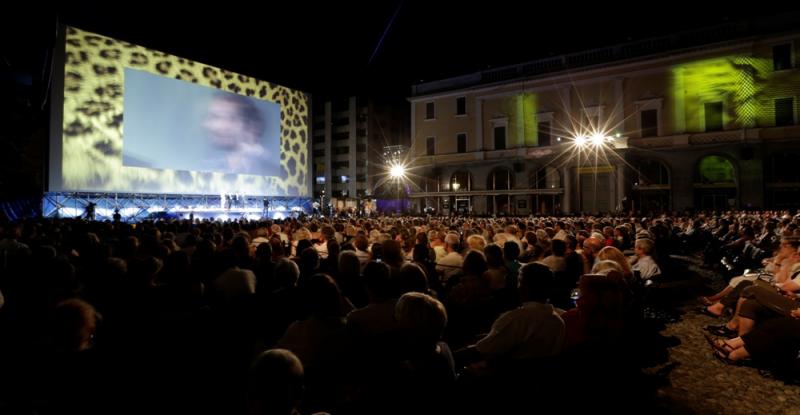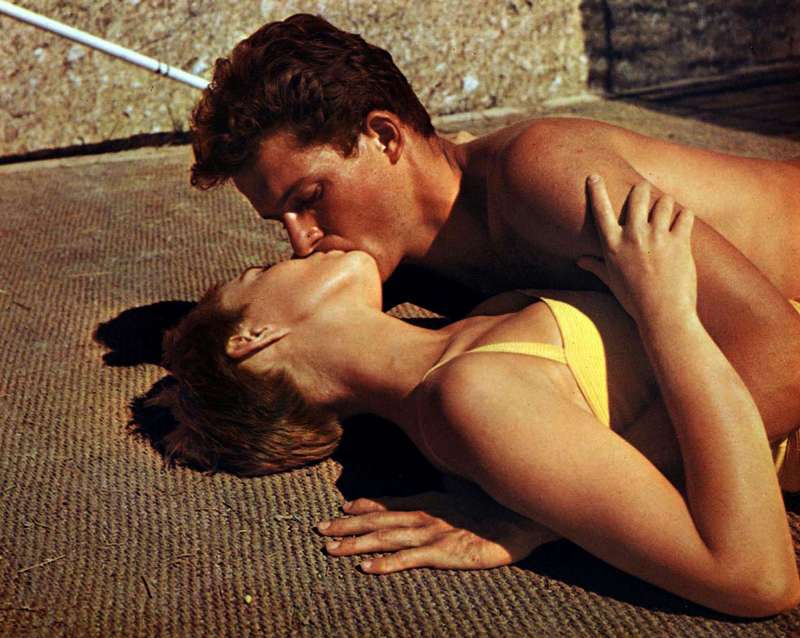theartsdesk in Locarno: Sunshine Cinema in the Alps | reviews, news & interviews
theartsdesk in Locarno: Sunshine Cinema in the Alps
theartsdesk in Locarno: Sunshine Cinema in the Alps
Summer, sometimes, where it matters at the Swiss film fest

The most radical Locarno ever: it's in the upper 20s Celsius in the southern Alps. The sky is cloudless blue. Moreover, not for one, or two, or three, or four nights in a row, but for FIVE has it not rained in this small resort. Next year no doubt it will again be the normal business of deluges in the Piazza Grande, and an air of anti-climactic, soul-freezing damp will prevail.
Good weather helps the mood but does not, of course, affect the quality of films. Of the ones I’ve seen in the Piazza (not in competition) only Pablo Larraín’s No, about a 1988 referendum in Chile to extend or bring an end to General Pinochet’s dictatorship, cut some mustard. It screened at Cannes.
A cross between Wes Craven and Carry On, perhaps a new term, dotty-totty, might be coined for it
Playing Santiago advertising man Rene Saavedra, Gael García Bernal (who shot to fame in Amores Perros) is both amiable and watchable in a somewhat tortured, cinematographically unappealing account of how the “no” campaign, under Saavedra’s direction, implausibly won and changed Chilean history. The style is pre-digital 1980s, the tone single key, but it’s stirring and informative, and tells a more important story than the one many of us are familiar with, namely Pinochet’s arrest in Britain in 1998 for possible extradition to Spain, and his release in early 2000. (The old bugger died six years later.)
Only the Swiss will be able to enlighten theartsdesk’s readers as to what on earth the point of Das Missen Massaker (“The Swiss Miss Massacre”) is. A cross between Wes Craven and Carry On, perhaps a new term, dotty-totty, might be coined for it: shown to whooping thousands on Friday night, Michael Steiner’s flick sees various regional beauty queens being mashed up by a Jason Vorhees type on a bonkers tropical island, and the right girl gets the Miss Switzerland crown at the end. I think. It made what followed straight after, a special screening of 1958’s Bonjour Tristesse (pictured below right) by Otto Preminger, subject of this year’s “Retrospettiva” section, with its Enid Blyton-eroticised script and Jean Seberg’s irksome delivery, seem shatteringly profound.
 In the competition, mixed pickings. The Portuguese A Última Vez Que Vi Macau (“The Last Time I Saw Macau”) by João Rui Guerra da Mata and João Pedro Rodrigues, while it evokes haunted cityscapes of the colony in China that wasn’t Hong Kong, is prodigiously dull: a kind of cod Borges detective story bolted on to the filmmakers’ unedited parade of dereliction. Locarno’s competition selectors might have done better to bring over from the “Cineasti del presente” section a much more intriguing offering from Brazil, Boa Sorte, Meu Amor (“Good Luck, My Love”) by Daniel Aragão.
In the competition, mixed pickings. The Portuguese A Última Vez Que Vi Macau (“The Last Time I Saw Macau”) by João Rui Guerra da Mata and João Pedro Rodrigues, while it evokes haunted cityscapes of the colony in China that wasn’t Hong Kong, is prodigiously dull: a kind of cod Borges detective story bolted on to the filmmakers’ unedited parade of dereliction. Locarno’s competition selectors might have done better to bring over from the “Cineasti del presente” section a much more intriguing offering from Brazil, Boa Sorte, Meu Amor (“Good Luck, My Love”) by Daniel Aragão.
Set in Recife and shot in black and white (well, ok, a bit pretentious), it tells of a man engaged to a young woman not unlike Seberg’s Cécile in the Preminger - cute, chatty, irresponsible - and the end of their affair under her brutal baron father’s hands in the north-eastern backlands. Fearsome stuff. It looks like something Derek Jarman at his darkest could have made, though Aragão will with luck go on to direct something even better than this.
The two north American sorties I caught have much to recommend them. Sean Baker’s Starlet (pictured below) is a crisp, uncompromising take on the compassion possible between extreme youth and old age. Dree Hemingway’s Jane is a willowy, dismissive, druggy blonde who chances on some significant cash hidden in a vase (“vayse”, as they say in the States) she’s bought from ancient, lonely Sadie (Besedka Johnson).
 Jane manipulates herself into caring for Sadie, and nothing in the film is predictable: Baker cleverly delays revealing Jane’s work - on the books of a porn-film agency (the one scene spelling this out will stop Starlet going on general release) - and the ending movingly suggests that girl and old woman’s relationship was meant to happen. “Starlet”, by the way, is Jane’s Chihuahua, but then so, of course, is Jane: Dree Hemingway is one to watch.
Jane manipulates herself into caring for Sadie, and nothing in the film is predictable: Baker cleverly delays revealing Jane’s work - on the books of a porn-film agency (the one scene spelling this out will stop Starlet going on general release) - and the ending movingly suggests that girl and old woman’s relationship was meant to happen. “Starlet”, by the way, is Jane’s Chihuahua, but then so, of course, is Jane: Dree Hemingway is one to watch.
Somebody Up There Likes Me (director Bob Byington) is on the surface a cooky comedy, set in Austin, Texas, interspersed with cartoons of clouds between scenes: graphics in a context like this always being a bad sign, I tend to think, but the quality of the writing and the acting is entirely mitigatory. Max, played by unknown Keith Poulson, is a goofy, feckless restaurant worker whose only luck is a coveted suitcase he carries everywhere which, opened, radiates some kind of light, a spell, which keeps him from aging.
He goes through two marriages, has a boy, is averagely rewarded in work, screws the nanny and is shadowed through all by an acerbic foil, Sal (Nick Offerman, a major US TV star). The movie is much wittier and more engagingly satirical than such a summary can suggest, and deserves a wide audience. It was certainly the happiest hour and a quarter for me of this sunniest of festivals and gratifyingly the Locarno jury gave it its special prize. Best film went to La fille de nulle part by Jean-Claude Brisseau.
Explore topics
Share this article
The future of Arts Journalism
You can stop theartsdesk.com closing!
We urgently need financing to survive. Our fundraising drive has thus far raised £49,000 but we need to reach £100,000 or we will be forced to close. Please contribute here: https://gofund.me/c3f6033d
And if you can forward this information to anyone who might assist, we’d be grateful.

Subscribe to theartsdesk.com
Thank you for continuing to read our work on theartsdesk.com. For unlimited access to every article in its entirety, including our archive of more than 15,000 pieces, we're asking for £5 per month or £40 per year. We feel it's a very good deal, and hope you do too.
To take a subscription now simply click here.
And if you're looking for that extra gift for a friend or family member, why not treat them to a theartsdesk.com gift subscription?
more Film
 Bugonia review - Yorgos Lanthimos on aliens, bees and conspiracy theories
Emma Stone and Jesse Plemons excel in a marvellously deranged black comedy
Bugonia review - Yorgos Lanthimos on aliens, bees and conspiracy theories
Emma Stone and Jesse Plemons excel in a marvellously deranged black comedy
 theartsdesk Q&A: director Kelly Reichardt on 'The Mastermind' and reliving the 1970s
The independent filmmaker discusses her intimate heist movie
theartsdesk Q&A: director Kelly Reichardt on 'The Mastermind' and reliving the 1970s
The independent filmmaker discusses her intimate heist movie
 Blu-ray: Wendy and Lucy
Down-and-out in rural Oregon: Kelly Reichardt's third feature packs a huge punch
Blu-ray: Wendy and Lucy
Down-and-out in rural Oregon: Kelly Reichardt's third feature packs a huge punch
 The Mastermind review - another slim but nourishing slice of Americana from Kelly Reichardt
Josh O'Connor is perfect casting as a cocky middle-class American adrift in the 1970s
The Mastermind review - another slim but nourishing slice of Americana from Kelly Reichardt
Josh O'Connor is perfect casting as a cocky middle-class American adrift in the 1970s
 Springsteen: Deliver Me From Nowhere review - the story of the Boss who isn't boss of his own head
A brooding trip on the Bruce Springsteen highway of hard knocks
Springsteen: Deliver Me From Nowhere review - the story of the Boss who isn't boss of his own head
A brooding trip on the Bruce Springsteen highway of hard knocks
 The Perfect Neighbor, Netflix review - Florida found-footage documentary is a harrowing watch
Sundance winner chronicles a death that should have been prevented
The Perfect Neighbor, Netflix review - Florida found-footage documentary is a harrowing watch
Sundance winner chronicles a death that should have been prevented
 Blu-ray: Le Quai des Brumes
Love twinkles in the gloom of Marcel Carné’s fogbound French poetic realist classic
Blu-ray: Le Quai des Brumes
Love twinkles in the gloom of Marcel Carné’s fogbound French poetic realist classic
 Frankenstein review - the Prometheus of the charnel house
Guillermo del Toro is fitfully inspired, but often lost in long-held ambitions
Frankenstein review - the Prometheus of the charnel house
Guillermo del Toro is fitfully inspired, but often lost in long-held ambitions
 London Film Festival 2025 - a Korean masterclass in black comedy and a Camus classic effectively realised
New films from Park Chan-wook, Gianfranco Rosi, François Ozon, Ildikó Enyedi and more
London Film Festival 2025 - a Korean masterclass in black comedy and a Camus classic effectively realised
New films from Park Chan-wook, Gianfranco Rosi, François Ozon, Ildikó Enyedi and more
 After the Hunt review - muddled #MeToo provocation
Julia Roberts excels despite misfiring drama
After the Hunt review - muddled #MeToo provocation
Julia Roberts excels despite misfiring drama
 London Film Festival 2025 - Bradley Cooper channels John Bishop, the Boss goes to Nebraska, and a French pandemic
... not to mention Kristen Stewart's directing debut and a punchy prison drama
London Film Festival 2025 - Bradley Cooper channels John Bishop, the Boss goes to Nebraska, and a French pandemic
... not to mention Kristen Stewart's directing debut and a punchy prison drama
 Ballad of a Small Player review - Colin Farrell's all in as a gambler down on his luck
Conclave director Edward Berger swaps the Vatican for Asia's sin city
Ballad of a Small Player review - Colin Farrell's all in as a gambler down on his luck
Conclave director Edward Berger swaps the Vatican for Asia's sin city

Add comment